Registration for the CLARIN Annual Conference 2022 Now Open
The 2022 CLARIN Annual Conference will take place as a hybrid event, which means that two different types of registration are available: virtual and in-person.
Virtual attendance is open to the general audience. Registration link here
In-person attendance is by invitation only. Authors will receive the registration link with the notification of acceptance, delegates will receive the link from their national coordinators, and keynote speakers and special guests will receive personalised messages.
The preliminary programme of CLARIN2022 is available here. The conference will run from Monday 10 October, 16:30 CEST, until Wednesday 12 October, 13:00 CEST. Closed meetings of CLARIN committees will precede the event on Monday between 9:00 and 16:00 CEST.
CLARIN2022 is a satellite event of the International Conference on Research Infrastructures (ICRI).
Registration for the Bazaar Is Now Open
The CLARIN Bazaar is an informal space at the CLARIN Annual Conference where you can meet people from other centres and share experiences and ideas. If you would like to have a stall in the CLARIN Bazaar, please register here.
Read more: https://www.clarin.eu/event/2022/clarin-annual-conference-2022
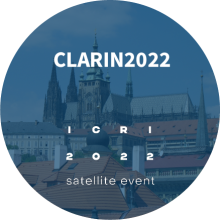
Teaching with CLARIN Call - Extended Deadline
Teachers and trainers who have used the CLARIN core services (such as the Virtual Language Observatory, the Virtual Collection Registry, Content Search, or the Language Resource Switchboard) to teach language research, methods, or different aspects related to linguistic data management, FAIR and open science, are encouraged to share their stories and teaching materials via the Teaching with CLARIN Call. All eligible materials will be showcased in the Teaching with CLARIN session at the CLARIN Annual Conference in Prague, 10-12 October.
Extended deadline for submissions: 15 July 2022
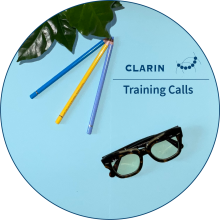
ParlaCLARIN III: Proceedings Now Online
On 20 June, as part of LREC2022, CLARIN organised the ParlaCLARIN III workshop on ‘Creating, Enriching and Using Parliamentary Corpora’. The proceedings of the workshop can now be browsed online, and found in the dedicated CLARIN Zotero library. The slides of all presentations will become available on the event page soon.
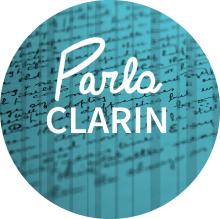
New Impact Story: Navigating the GDPR with Innovative Educational Materials
This latest impact story showcases the project ‘Privacy in Research: Asking the Right Questions’, an engaging response to the challenges faced by researchers working with sensitive data. Commended as best practice by the Council of Europe, the project team has developed a portfolio of modular and interactive educational materials designed to help researchers and students navigate the maze of privacy concerns when embarking on research involving personal data covered by the General Data Protection Regulation (GDPR).
The project is important in the context of open science and the FAIR principles, as it facilitates the responsible sharing and reuse of data that is relevant for a range of research areas, as well as clinical applications, artificial intelligence and education more widely.
Read the full impact story here

Updates from National Consortia
The Charles Translator for Ukraine: A development by LINDAT/CLARIAH-CZ
The automatic translator for Czech and Ukrainian, recently developed at the Institute of Formal and Applied Linguistics (ÚFAL) of Charles University, is now also available as a mobile application for Android. Users can download the Charles Translator for Ukraine app free of charge from the Google Play store.
The translator was developed with support of LINDAT/CLARIAH-CZ, and runs on the LINDAT technical infrastructure. It was developed in record time after the Russian invasion of Ukraine and the subsequent wave of refugees into the Czech Republic, and it has been freely available for non-commercial purposes since mid-March at https://translator.cuni.cz.
The application allows translation between Czech and Ukrainian in both audio and text form, and phonetic transcriptions between Latin and Cyrillic are available for translations.
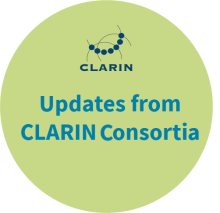
Blogs and Reports
A Recap of the CLARIN Centre Meeting 2022
The Centre Meeting is the yearly gathering for everyone who is involved in setting up or hosting a CLARIN centre, with a special focus on technical infrastructure.
After two years of virtual Centre Meetings, this year’s edition took a hybrid form. Topics on Day 1 of the event included discussions on remote back-ups of data and workflows for dealing with sensitive data, while Day 2 was dedicated to meetings of the technical task forces.
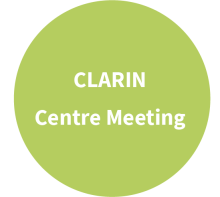
Training and Education
UPSKILLS event: Teaching Transferable Skills to Future Language Experts
5 July 2022, Graz, Austria (hybrid event)
During this one-day UPSKILLS event at the University of Graz, the organisers will share guidelines for the collection and creation of learning content for language-related courses. The event is aimed mainly at university-level teachers.
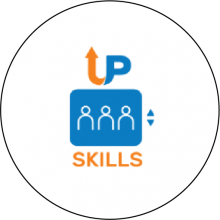
New Digital Humanities Course Registry Poster: Storytelling
The Digital Humanities Course Registry (DHCR) contains a selection of DH courses offered by European academic organisations. The platform for the sharing of information on DH courses is a joint effort by the European research infrastructures CLARIN ERIC and DARIAH-EU. Students, lecturers and researchers can search the database on the basis of discipline, location or academic degree awarded. In line with the recent theme of Storytelling at the DARIAH Annual Event, Iulianna van der Lek and Anna Woldrich have created a new poster to show what the DHCR has to offer.
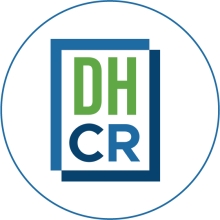
Tutorial: Processing Full-Text Resources with Jupyter Notebooks
Computational notebooks provide a popular environment for literate programming, especially in educational contexts. Recently, CLARIN and Europeana jointly organised a one-day training session: Using Jupyter notebooks, participants processed Europeana newspaper resources with CLARIN tools. The notebooks can now be accessed on GitHub and via the SSHOC Marketplace.
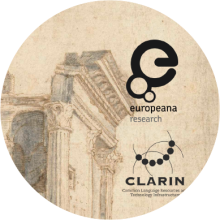
Watch This!
A Video Summary of CLARIN’s Flagship Project ParlaMint
Learn more about CLARIN’s flagship project ParlaMint in this video presented at METa-FORUM 2022. ParlaMint focuses on the creation of comparable and uniformly annotated multilingual corpora of parliamentary sessions. In its first phase, ParlaMint made corpora available for 17 languages, and started to use them in training and research. Now in its second phase, ParlaMint is working towards extending the existing datasets and improving their usability.
Events and Calls
FAIRCORE4EOSC Kick-Off Event
Amsterdam, 29-30 June 2022 (hybrid event)
CLARIN is pleased to announce that it will participate in the new EU-project FAIRCORE4EOSC. The project will develop new core components of the European Open Science Cloud ( ) to improve interoperability and create an accessible and FAIR platform for researchers. On 29 June, from 9:15-11:10 (CEST), the objectives of FAIRCORE4EOSC, as well as its impact on the wider EOSC context, will be introduced. This part of the kick-off is open to the public and can be followed via live stream.
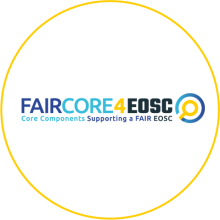
International Conference on Research Infrastructures (ICRI)
19 - 21 October 2022, Brno, Czechia (hybrid event)
The ICRI provides an opportunity for strategic discussions about international cooperation across research infrastructures (RIs). A variety of experts and stakeholders will discuss challenges and emerging trends, highlighting the essential role of RIs for the research landscape. In the plenary session on how research infrastructures are addressing societal challenges, CLARIN’s Executive Director Franciska de Jong will discuss CLARIN's response to the COVID-19 pandemic: Turning the existing parliamentary data harmonisation initiative into the flagship project ParlaMint that enables comparative research of political debates on COVID-19 related topics across around 20 languages.
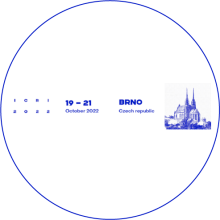
Call for Abstracts: 1st International Conference on FAIR Digital Objects
28 - 28 October 2022, Leiden, The Netherlands
Held in Leiden, the European City of Science 2022, this conference brings together the key technical, scientific, industry, and science-policy stakeholders with the aim of boosting the development and implementation of FAIR Digital Objects (FDOs) worldwide. This milestone event will initiate the process of turning FAIR data into reality in a systematic way, with the signing of the ‘Leiden Declaration on FAIR Digital Objects’ planned on the final conference day.
Deadline for abstract submissions: 26 June 2022
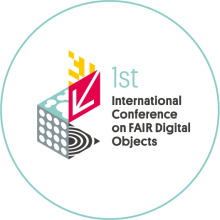
Registration for the EUDAT Conference 2022 Now Open
13 - 15 September 2022, Athens, Greece
The conference focuses on new developments in the field of research data management services and aims to promote networking with some of the most active players in the field. To this end, the 2022 edition of the conference will offer a networking session to stimulate exchange and encourage new connections. The conference is aimed at researchers and citizen scientists, repository and community managers, actors in the EOSC community, , science clusters, and research infrastructures, as well as EUDAT users and user communities.
Early-bird registration closes 30 June 2022
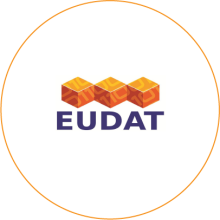
Call for Papers: Conference on Cultural Heritage and New Technologies (CHNT)
10-12 November 2022, Vienna, Austria (hybrid event)
CHNT invites attendees to present current research towards the application of technologies in research, management and presentation of cultural heritage. Confirmed sessions of this year’s CHNT include, but are not limited to, cultural heritage and the metaverse and FAIR 3D data in cultural heritage.
Deadline for paper submissions: 27 June 2022
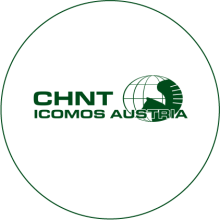
3rd Workshop on Resources for African Indigenous Language (RAIL)
30 November 2022, Potchefstroom, South Africa
This workshop, organised by the South African Centre for Digital Language Resources (SADiLaR), is an interdisciplinary platform for researchers working on resources specifically targeted towards African indigenous languages. It aims to create the conditions for the development of a scientific community of practice that focuses on data, as well as tools, specifically designed for or applied to indigenous languages found in Africa. The workshop will allow for discussions on improving the quality and availability of resources. Many African indigenous languages currently have no or very limited resources available and are often structurally different from more well-resourced languages, requiring specialised techniques. The workshop 2022 will be co-located with the 10th Southern African Microlinguistics Workshop.
Deadline for papers: 28 August 2022
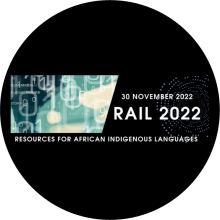
Open Call for RDA Cross-Disciplinary Adoption in Support of EOSC
This EOSC Future call specifically targets smaller community projects to showcase cross-disciplinary implementation and uptake of recommendations and outputs within the EOSC context. Projects that have adopted existing RDA recommendations and other outputs which can benefit the EOSC community, or those that act as strong examples of open and community-led standards as well as cross-domain interoperability, are particularly encouraged to apply.
The RDA Open Call programme offers up to four grants of maximum €50.000,00 each to support the work in this area over the course of the EOSC Future project (ends September 2023). The call welcomes applications from non-academic and commercial partners, junior and senior researchers, as well as data scientists, based in research groups or institutions, or SMEs across Europe, provided they meet the criteria in the call.
CLARIN has been involved with RDA for many years, contributing to several RDA outputs that are also relevant in the EOSC context and is therefore keen for research groups, organisations or small-scale infrastructures that are part of the broader CLARIN network to apply. CLARIN can offer advice on and support with the application process for suitable proposals. For more information on the available support, please email newsflash [at] clarin.eu .
Application deadline: 11 July 2022
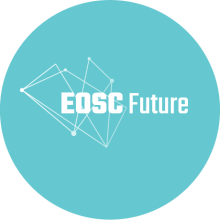
Call for Papers: Third Conference on Computational Humanities Research (CHR)
12-14 December 2022, Antwerp, Belgium
CHR aims to build an international and interdisciplinary community, to promote good practices in science, and to support researchers with an interest in computational approaches to the humanities. The organisers invite papers on topics including applications of statistical methods, modelling bias, and translation of methods from other disciplines.
Deadline for paper submissions: 2 September 2022
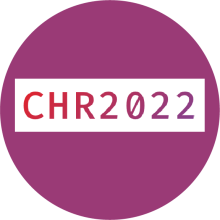
Job Openings
Teaching Associate in Digital Humanities
University of Cambridge, Cambridge, UK
Cambridge Digitial Humanities (CDH) is looking for a Teaching Associate, who will prepare and deliver primarily postgraduate teaching and supervision, but might also contribute to other forms of DH teaching. CDH is seeking candidates with a wide range of expertise in digital humanities, which they conceive as an expansive and intrinsically interdisciplinary field that brings together research focused around collections, platforms, digital methods, public cultures, digital aesthetics, cultural analytics, digital media studies, medium theory, digital justice, and cultural critique.
Deadline for applications: 26 June 2022

Assistant Professor in Computational Social Sciences
Sciences Po médialab, Paris, France
Sciences Po médialab is recruiting an Assistant Professor in computational social sciences to reinforce its capacity for quantitative analysis of the digital public space. The position is intended for a candidate who has demonstrated a capacity to renew methods of analysis of digital data which may have an impact in social science research (sociology, political science, history). The position is open to a variety of approaches, including machine learning, statistical analysis, network, text or image analysis.
Deadline for applications: 15 September 2022
